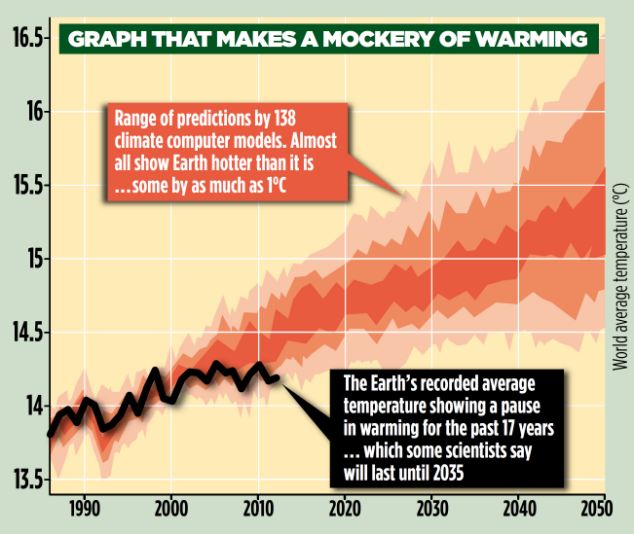Deviation Actions
Description
Climate Journal Vol #0 Issue #6
Climate scientist Dr. Judith Curry recently published a paper in the peer-reviewed journal Climate Dynamics. The paper describes what is called a 'Stadium Wave,' which occurs in the atmosphere, in a cycle which runs its' course approximately every 300 years. This of course is one of a whole series of cycles which the climate is subjected to- but it points up the serious possibility that the recent decades of warming are little more than natural variability in the climate system.
It also suggests that what the pro-'man-made' global warming crowd calls 'The Pause' in global warming - a virtual Flatlining of temperature increases, at .04 degrees per decade - may very well continue into the 2030s.
In other words, Not Much is going to be changing, for a very long time.
And the IPCC never predicted anything like this!
From the Daily Mail:
The 17-year pause in global warming is likely to last into the 2030s and the Arctic sea ice has already started to recover, according to new research.
A paper in the peer-reviewed journal Climate Dynamics – by Professor Judith Curry of the Georgia Institute of Technology and Dr Marcia Wyatt – amounts to a stunning challenge to climate science orthodoxy.
Not only does it explain the unexpected pause, it suggests that the scientific majority – whose views are represented by the UN Intergovernmental Panel on Climate Change (IPCC) – have underestimated the role of natural cycles and exaggerated that of greenhouse gases.
The research comes amid mounting evidence that the computer models on which the IPCC based the gloomy forecasts of a rapidly warming planet in its latest report, published in September, are diverging widely from reality.
The graph shown above, based on a version published by Dr Ed Hawkins of Reading University on his blog, Climate Lab Book, reveals that actual temperatures are now below the predictions made by almost all the 138 models on which the IPCC relies.
The pause means there has been no statistically significant increase in world average surface temperatures since the beginning of 1997, despite the models’ projection of a steeply rising trend.
According to Dr Hawkins, the divergence is now so great that the world’s climate is cooler than what the models collectively predicted with ‘five to 95 per cent certainty’.
Curry and Wyatt say they have identified a climatic ‘stadium wave’ – the phenomenon known in Britain as a Mexican wave, in which the crowd at a stadium stand and sit so that a wave seems to circle the audience.
In similar fashion, a number of cycles in the temperature of air and oceans, and the level of Arctic ice, take place across the Northern hemisphere over decades. Curry and Wyatt say there is evidence of this going back at least 300 years.
According to Curry and Wyatt, the theory may explain both the warming pause and why the computer models did not forecast it.
It also means that a large proportion of the warming that did occur in the years before the pause was due not to greenhouse gas emissions, but to the same cyclical wave.
‘The stadium wave signal predicts that the current pause in global warming could extend into the 2030s,’ said Wyatt. This is in sharp contrast with the IPCC’s report, which predicts warming of between 0.3 and 0.7C by 2035.
Wyatt added: ‘The stadium wave forecasts that sea ice will recover from its recent minimum.’ The record low seen in 2012, followed by the large increase in 2013, is consistent with the theory, she said.
Even IPCC report co-authors such as Dr Hawkins admit some of the models are ‘too hot’.
He said: ‘The upper end of the latest climate model projections is inconsistent’ with observed temperatures, though he added even the lower predictions could have ‘negative impacts’ if true.
But if the pause lasted another ten years, and there were no large volcanic eruptions, ‘then global surface temperatures would be outside the IPCC’s indicative likely range’.
Professor Curry went much further. ‘The growing divergence between climate model simulations and observations raises the prospect that climate models are inadequate in fundamental ways,’ she said.
The full article plus comments can be found here.
Climate scientist Judith Curry discusses her paper here.
Further discussion of the science can be found here.
For those who wish to delve deep into the subject, the peer-reviewed paper can be found in its' entirety in PDF form, here.
---
Author's comments:
I'm writing this at three in the morning. Haven't got my thoughts together yet. Will try to get back here later today with something Coherent *g*
But, as you can see, climate science is far from settled.
Ah! As to the title I chose: it was difficult to get something Short enough to fit. I thought this one might catch attention right away.
I've kinda thought what is 'happening' is of cyclic origin. Reading your submissions/articles here is just bolstering that opinion.






















